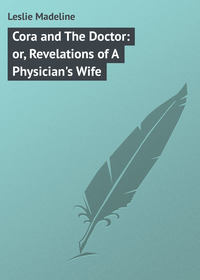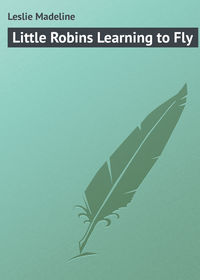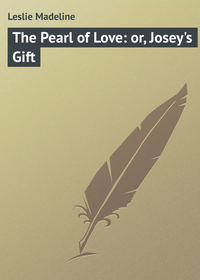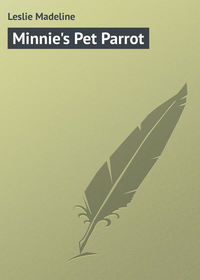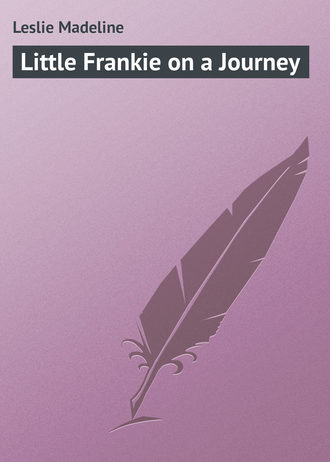 полная версия
полная версияLittle Frankie on a Journey

Leslie Madeline
Little Frankie on a Journey
CHAPTER I.
FRANKIE'S BIRTHDAY
"Frankie," said mamma one evening, just as he was going to bed, "to-morrow you will be six years old; how should you like to have a party of your young friends?"
"I should like it very much indeed," replied the boy, his eyes sparkling with pleasure.
"You have been trying to improve lately, my dear, and have almost conquered your hasty temper. Your father and I have been so much pleased with your conduct that we wish to reward you; so if you would like to have a party, I shall invite as many of your young friends as you please."
"O, what a kind mamma!" exclaimed Frankie, clasping his arms around his mother's neck. "I mean to try to be just as good as I can."
The little boy then knelt by his low bed, and said his evening prayer. Perhaps you would like to hear it.
"O God! thou art very good. Thou hast given me a kind father and mother, and food to eat, clothes to wear, and many other favors. Wilt thou forgive all my sins, and make me a good boy, so that when I die, I can go to heaven to live with thee, for my dear Saviour's sake. Amen."
This little prayer Frankie had learned when he was four years old, and he had repeated it every night since that time. Beside this he said the pretty verse beginning and then added a short prayer of his own, asking God to bless papa and mamma, Willie, Nelly, and Margie; to keep the house from being burned while they were asleep; and to make the heathen good, for Jesus Christ's sake.
"Now I lay me down to sleep,"When Frankie was nearly five years old, a large house in the neighborhood had been burned to the ground. He was aroused from his sleep by the loud ringing of the bells, and the cry of fire, and sat for a long time gazing from his mother's window at the bright, red flame. Ever since that time he had always prayed God to keep the house from being burned while they were asleep.
In the morning, Frankie said the Lord's prayer, and this pretty little hymn, which perhaps you will like to learn: —
"Fled away are the shadows of night;The morning is smiling and clear;The sun has arisen all bright,And the birds fly aloft in the air."The sweet robins sing on the tree,The little lambs skip on the hill,And loud hum the bees as they work,Their houses with honey to fill."'Tis time for the children to wake:Come, little ones, open your eyes;And your thanks and your praises returnTo the Being who governs the skies."He has guarded you, all the long night,From sickness, and danger, and pain,And brought you, in safety and peace,To a beautiful morning again."Whatever your parents command,Be ready and willing to do;For that, my dear child, is the wayTo be happy, and prosperous too."But if (as is sometimes the case)You should happen to do a thing wrong,Just own it, and let not a lie,In any case, come from your tongue."For the child who is gentle and kind,And obliges as far as he can,May be sure to be loved while a boy,And respected when grown to a man."The next morning, when Frankie went down to breakfast, Willie sprang out from behind the door, and gave him six loud kisses. Then he took from his pocket a beautiful new humming top, and said, "Here is your birthday present."
Frankie had hardly time to say, "O, how pretty! I thank you very much," when Nelly came in smiling, and looking very happy, with something hidden behind her.
"Let me give you some birthday kisses," she said, reaching forward and putting up her pretty red lips – one, two, three, four, five, six. "Now guess what I've got for you;" and she began to laugh merrily.
Frankie looked very grave, because he was trying to guess. He would have said a new hoop, only he thought if it was that, he should see it sticking out from behind her dress.
"You can't tell, I know," shouted Nelly. "Will you give up?"
"Yes," said Frankie.
"There!" exclaimed the little girl, with a quick motion bringing from behind her a large tin tip cart, with two red oxen waiting to draw it along. "Isn't it pretty? I bought it with my own spending money, and I've been saving it for your birthday ever so long."
"O, I do thank you!" exclaimed the delighted boy; and he kissed his cousin more than six times, and then began to roll the cart on the floor.
"Come to breakfast now," said mamma; "and then you shall play with your new toys."
After the children had been to prayers with their parents, they ran up to the play room. Sally was turning the mattress in her mistress's room; but as soon as she heard their voices, she presented little Frankie a small handkerchief with two pretty pictures printed upon it. One was of two little girls taking a walk, and meeting a poor, lame beggar man; the other of a good boy standing at the door; calling his sister to take a ride. Perhaps, some time, I will repeat to you the pretty hymns which were printed underneath; but now it is time for me to close this chapter.
CHAPTER II.
FRANKIE'S PARTY
Perhaps you will wonder whether papa and mamma gave Frankie a present. Yes, they did; but he did not see it until the evening when his little friends came to his party. Jane, too, and even little Margie, remembered it was his birthday, and had a present ready for him.
Jane, with the consent of her mistress, had made a large frosted cake for his company; and Margie gave him a beautiful white kitten, with not one black hair on it.
As it was a holiday, there were no lessons to be learned. Mamma took a walk to the store; and she allowed Nelly and Frankie to go with her and carry the basket in which she intended to bring back the nuts for the party.
But first she showed them a small basket full of notes which she had written, inviting the little boys and girls to come and pass the evening with Frankie, and help him to keep his birthday. Willie and Margie were to carry them, as there was no school.
Ponto was very lively that morning. He seemed to understand that his young master was unusually happy; and he kept jumping up on him, wagging his tail, and trying to lick his hands and face. Willie had taught him to carry a basket in his teeth; and as soon as they started on their walk he began to whine, and put his nose into the basket until they gave it to him. Then he trotted along quite contentedly after them.
It was a very hot day, and after dinner mamma tried to persuade the little folks to lie down and get a nap, so as to be bright and fresh for the evening. Nelly at last lay down on the lounge in her aunt's bed room; and then Frankie brought his pillow, and lay on the floor by her. They were so happy, they wanted to talk about the party.
Mamma was lying on the lounge, too. She was very tired after her long walk in the morning, and wanted to go to sleep. But the children's tongues ran so fast, that she could not. She laughed, at last, at the very idea of sleeping there, and took her pillow into Nelly's room, where it was dark and cool; and presently had forgotten all her fatigue.
About seven o'clock the little folks began to arrive. In August, you know, the days are very long, so that it was still light, and as the sun was down, it was the pleasantest part of the day.
Mr. and Mrs. Gray sat on the large iron chairs belonging to the portico, and shook hands with the little girls and boys coming up the avenue; then joining the company on the lawn, where Willie and two of the larger girls were planning some games for them.
After they had enjoyed themselves in this way for an hour, Mrs. Gray called Margie from the lawn, and told her to invite the children to come in. Then she introduced them into the parlor, where on the table they saw a large pile of cards, nearly half a yard in length, with beautiful pictures on them, representing animals and birds; some of them as large as life.
These, which came in a long box, with a brass handle on the top, were Frankie's birthday present from papa and mamma.
At first the little fellow was so surprised, that he could not speak a word; but then he ran, first to his mother and then to his father, put his arms around their necks, and thanked them over and over again.
His father went to the table and distributed the cards round among the excited, happy group, and for half an hour there was one continued shout of delight in examining them.
"O, see this great elephant!" said one little boy; "he is winding his nose around that baby, and is going to kill him."
"No, indeed!" said mamma, "that baby is the child of his keeper, the man who takes care of him, and feeds him. See, the soldiers are coming up, and the good elephant is afraid they will hurt his little charge; so he takes it very gently in his trunk, or proboscis and puts it over behind him into a safer place."
"I like that elephant," said Frankie; "but I shouldn't think the baby's mamma would leave him to take care of it. I should think she herself would keep it in her arms."
"What is this lion doing?" asked a pretty, blue-eyed girl, named Rosa. "See, it is holding out its paw."
"It is learning to shake hands, I should think," said Willie, laughing aloud.
"There is a very pretty story connected with that," said his father. "There was once a slave who ran away from his master, and hid in a cave. After he had been there a short time he heard a noise, and looking around he saw he was in a lion's den. His heart began to beat faster than ever, for he thought, 'I have run away only to be killed by this lion.' He fixed his eyes upon the beast, expecting every minute that he would jump upon him and tear him to pieces.
"Presently the great lion came slowly up to him, and held out his paw, as you see in the picture. The slave then saw that there was a large thorn sticking in his foot. He pitied the poor creature, though he expected every minute to be killed by him. He took the paw gently in his hands, got firm hold of the thorn, and pulled it out.
"The lion was very much obliged to him, though he could not say so in words. He lay down at the slave's feet, to show him that he would not injure him.
"A few days after, some men were hunting in the forest; and they caught the great lion, and carried him away with them; and they also caught the poor slave, and took him back to his master, who was the king. The king was very angry with him for running away, and ordered that he should be thrown into a den with a hungry lion, who would eat him up.
"This was a dreadfully cruel punishment; but as the king had ordered it, a great many people gathered together to see it inflicted. The den was opened, and a great, fierce lion came bounding in, leaping and roaring for his food. Presently another door was opened, and the poor slave was seen crouching back against the wall to escape from his terrible enemy.
"As soon as the lion saw him, he gave one tremendous roar, and sprang several yards toward the slave.
"Then all the people gave a great shout, for they thought that, almost before they could look again, the slave would be dead. But to their great surprise, the fierce, hungry lion, that had had no food for two days, was on his knees before the slave, who had his arms around the animal's neck, embracing him as if he were his dearest friend.
"The king was so astonished at this sight, that he cried out, 'Pardon! pardon!' So they took the slave from the den, and threw in another criminal, who was instantly torn to pieces."
I have spent so much time telling you about these beautiful pictures, that I can only say the children were invited into the dining hall, where they were feasted on nuts, cake, fruit, and lemonade; and went home, after thanking Mrs. Gray for inviting them to so pleasant a party. Frankie, when he kissed his mamma good night, said, "I wish I could have a birthday every week, I like them so much."
CHAPTER III.
FRANKIE'S JOURNEY
A few weeks after this birthday, Frankie went a journey with papa, and mamma, and Willie, and Nelly.
Nelly's father and mother had been home two or three months; but they found their little girl improving so fast under her aunt's care and teaching, that they did not like to take her away.
Nelly was very well contented to remain with her kind friends; and when she found Frankie alone in a room by himself, crying because he thought her mother had come to carry her home, she promised she would live with him always.
Mr. Gray hired a carriage and a span of handsome horses, and one fine morning in September they started off; papa and Willie on the front seat, and mamma with Frankie and Nelly on the back. Sometimes, though, they wanted to change, and the two little ones rode in front with papa, while Willie took their place behind.
Then once in a while, when they were tired, papa would stop the horses, and let them all get out and walk up a long hill; and O, how fast the little feet would fly, trying to see who would reach the top first!
It made this good papa and mamma happy to see their children enjoy themselves so well.
They travelled on for several days; and one night they came to a small town, where Mr. Gray said he would put up. They drove to the tavern, and soon were shown to a room up stairs. While they were waiting for supper, Frankie asked, "What is the name of this town, papa?"
"It is Canaan, my dear," replied his father.
The little boy now gazed around with great interest; went to the window and looked out, and presently said, "It don't seem very pleasant, papa; but I suppose the Israelites were glad to get here."
Frankie thought this Canaan was the pleasant land which God promised to his chosen people. If you don't know about it, ask your mamma to tell you how the Israelites wandered in the wilderness for forty years, eating manna for bread, and quails for meat, all the time longing to reach Canaan, where there was an abundance of milk and honey, and you will know why Frankie thought they would be glad to get there.
Papa and mamma laughed heartily when he said this, and papa told him that Canaan was a great way off from this place. It was the name of a whole country, while this was only a small town.
When Frankie heard this, he walked away from the window, and sat quietly by mamma until they were called to tea.
The next morning the road led through a large forest of pine trees. The wind was blowing quite a breeze, and Frankie was glad to get under his mother's shawl on the back seat of the carriage. He lay so still that she thought he was asleep; but at last he asked, "Are these mulberry trees, mamma?"
"No, dear, they are pine."
"Well, mamma," said the little fellow, "they sound like mulberry trees."
"Where did you ever hear any, my dear?" asked his mother.
"Why, you know," said he, "that you read me in the Bible about 'the sound of the going in the tops of the mulberry trees,' and I think it was just like this."
Before they started from home, Mrs. Gray had partly promised her sister-in-law that she would stop there with Nelly and Frankie on their return, and make a visit; but on the last day of their journey, it was quite cold and rainy. Mr. Nelson, her brother, lived in a town several miles out of their way; and so she concluded to go directly home, and start again when it was pleasant.
After riding ten or twelve miles, Frankie and his little cousin became very tired. The rain prevented their getting out of the carriage for a run, neither could they sit on the front seat and watch the horses.
"I wish I had a watch," said Frankie; "I don't like to trouble you, mamma, to take yours out so often; but I do want to know what time it is."
"I mean to ask father to buy me a watch," said Nelly, "just as soon as I go home."
"How much farther have we to go, papa?" asked Frankie.
The rain was pattering so fast on the top of the carriage, that he did not hear at first; but when Willie repeated his brother's question, papa said, "We have ten miles to go before dinner; and then twenty-two afterwards. How many does that make?"
Frankie thought for a minute, and then answered, "Thirty-two, papa."
"If you're so tired," said Willie, "why don't you play school? I'll be the first class."
"So will I," said papa, laughing.
"O, that will be splendid!" said Nelly, clapping her hands.
"Will you be the teacher, mamma?" asked Frankie, quite forgetting his fatigue.
"No, dear, Willie may turn his back to the horses, and be the teacher first. You can take turns."
"Why didn't I think of this way before?" said Willie; "it's real nice. The rain came pouring right in my face. Now I can put this shawl up, and keep it all off."
"You crowd my knees dreadfully," said Frankie.
"Don't be impatient, dear," said his mother. "We must all try to be accommodating when we are out in the rain. Your brother has been sitting very patiently with the rain beating in his face, and you will be glad, I'm sure, to have him with us behind."
"I can't move my feet at all," said Frankie, in an impatient tone.
"Move a little this way, then; I am sure we can make room for all. Perhaps," she said softly, "there is somebody in your corner who ought to be driven out."
The little boy turned quickly round before he thought that his mother meant Satan; and this made them all laugh. Frankie was still rather fretful, but Willie began blowing with all his might. Willie and Nelly both looked so merry that he put away his naughty feelings, began to laugh, and soon found plenty of room on the seat.
CHAPTER IV.
PLAYING SCHOOL
"Now I'll give you a word to spell," said Willie; "I bet none of you can spell it right."
"Don't say bet, my dear," said his mother. "It is not a good word to use. Beside, you are a teacher now, you know."
"The boys at school all say bet, mother," answered Willie. "I don't see any hurt in it."
"But do they really bet?" asked his father.
"O, no, indeed, sir! It is only a habit they have of saying so."
"It is a low expression," said his mother. "I wish you wouldn't use it."
"Well, I won't, mother, when I can think of it. But I'll give you the word. It is Constantinople."
"It is a long word," said mamma. "But I will try it;" and the lady's eyes twinkled as she began, "C-o-n, Con; s-t-a-n, Constan!"
"Stop! please stop, mother!" shouted Willie, laughing heartily. "You know it; let me try father?"
"No, try me," said Nelly; "try me once!"
"Well, I will. Spell Con."
"C-o-n, Con," repeated Nelly slowly, looking steadily in her cousin's face.
"That is right; stan."
"S-t-a-n," said Nelly.
"Yes; now spell ti," added Willie.
"T-i, ti."
"No," said the boy, shaking his head solemnly.
"T-y," again tried the little girl.
"No," said Willie still more seriously.
"T-i-e," shouted Frankie.
"No," again repeated Willie.
"N-o, no," said his father.
Nelly and her cousin looked astonished.
"O father! That wasn't fair," cried Willie. "They wouldn't have spelt it at all."
"When I went to school," said his father, laughing, "any body in the class had a right to spell the word if the others missed it."
When the travellers stopped for dinner, it rained so hard, that Mr. Gray said he didn't know as they would be able to go on. They were in a small, poorly-furnished tavern; and it did not look as if they would have a very good time if they staid.
"We are quite comfortable behind," said the lady; "but it must be very bad for you."
"The boot comes up so high that it keeps the rain out, except from my face," said Mr. Gray. "Perhaps I can manage in some way to carry an umbrella."
"That would be too hard," replied the lady. "If you think it best, I am willing to stay."
After waiting at the tavern about two hours for the horses to rest, Mr. Gray told the children to make haste and put on their clothes, as the carriage was coming to the door. They did not know, until then, whether they were to go or stay.
"Do you think it best to go?" asked the lady. "It is raining so hard, I am afraid you will be very wet."
"O, look at the carriage, papa!" shouted Frankie, as it drove past the window.
"I found a nice leather curtain in the box," said the gentleman, "which will shield me entirely."
"What a pity you did not find it this morning!" said Willie.
When they were seated in the carriage, they rode for nearly a mile before there was much said by the children. The new curtain proved a good screen from the rain, so that Mr. Gray was able to enjoy the ride as well as the rest of the party.
Frankie had been watching the drops as they fell from the lower edge of the curtain upon the leather boot; at last he said, "It seems as if we were in the ark."
"Why?" asked his mother, with a smile.
"Because – because it seems as if we were out in the rain, with waters all around us; but we are safe in here, and nothing can harm us."
"What shall we do now?" asked Willie. "Play school again? I call it real good fun."
"Let us sing," said Nelly.
"So we will; so we will!" and they began the sweet hymn commencing, —
"Jesus, thou heavenly stranger,Who dwelt in mortal clay!Thy cradle was a manger,Thy softest bed was hay.""O, mamma!" cried Frankie, when they had finished the tune, "can I read the pretty verses on my handkerchief?"
"Yes, dear, I should like to hear them," said mamma.
This was Sally's birthday present, which he had kept nicely folded in his coat pocket. I have already described to you the picture, which was of a little boy calling his sister to take a ride. Frankie could read now quite well, though he was obliged to pronounce the words slowly, once in a while stopping to spell one to himself. He began, —
"The coach is ready, sister; run,And put your gloves and bonnet on;It is about a week agoOur parents promised us, you know,If we were good, that we, to-day,Should have the coach and ride away.Our cousins, too, are all at home;How glad they'll be to see us come!And they, such lovely girls and boys,Will have so many pretty toys!And we shall have the sweetest ride,Through trees along the river side!Come, sister; come, make no delay!'Tis time for us to start away.What ails you, Mary? ar'n't you well?What makes you cry so? sister, tell!""Harry, I can't; don't ask me why;And yet I must —I've told a lie!And here shut up I'm doomed to stay,And mourn and weep the livelong day.I shall not dare my face to show,Nor join the children's plays, you know;They'll see my tears, and then inquireWhat I have done – and call me liar.And, Harry, I'm afraid that youAnd Harriet will hate me too.But what is worst of all, mammaDon't speak to me, nor does papa;Not once upon me have they smiled,Since I was such a wicked child.O, it will break my heart, I'm sure!I never told a lie before,And never, never will again,If I their pardon can obtain.Go – it is time that you were gone,And leave me here to cry alone."Nelly sighed two or three times while her little cousin was reading; and when he had finished, she said, "I'm glad I don't tell lies now. I didn't use to know how wicked it was."
Mrs. Gray bent down and kissed her little niece, and then said, "I am sure, my dear, God will forgive the past, if you ask him, for the sake of his dear Son."
"I wonder whether her mother let her go to ride," said Frankie, fixing his eyes on the picture. "I should think she would, when the little girl was so sorry."
As no one replied to his remark, he said, presently, "Here is another pretty piece; may I read this too, mamma?"
"Perhaps Nelly would like to read," said the lady.
"O, yes, aunty," said the little girl; "may I, Frankie?"
He passed her the handkerchief, though he did not do it very cheerfully.
"Thank you," said Nelly. "You can look over with me, if you want to." Then she began to read the verses that were underneath the picture of the little girls and the poor beggar: —
"Look, sister, see how rich I be!Six cents mamma has given me,Because it is a holiday;And now I'm going off to play.But let me think: what shall I buy?A cake – or else some pretty toy!I've wanted long a Jumping Jack.Well, that I'll buy, and not a cake.But stop, dear sister; who is this?A poor old man! – how lame he is!How lean he looks, and ragged too! —Give him some dinner, sister, do.Now he will have to go away,And beg his dinner every day.I wish I had a dollar now;Six cents will buy some dinner, though;And as he travels on the road,Some biscuits would taste very good;And he shall have them – so I'll playWithout a Jumping Jack to-day."


